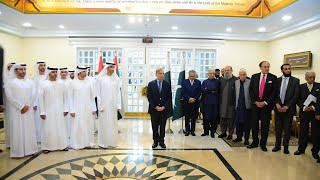The Businessmen Panel (BMP) for Federation of Pakistan Chambers of Commerce and Industry says that lack of trade policy is the main cause of crippling trade imbalance as Pakistan failed to sign a single Free Trade Agreement (FTA) in the last five years, Talking with Business Recorder BMP Secretary General (Federal) and FPCCI former Chairman Standing Committee, Ahmad Jawad said that though the PML-N government had started negotiations on various trade agreements including the Free Trade Agreement (FTA) and Preferential Trade Agreement (PTA) with a number of countries, yet it could not conclude any such agreement in the past five years.
Jawad further told that Pakistan's economy failed to benefit from any of the six bilateral trade agreements over the past one decade as it could not get tariff incentives from its trading partners. The country had earlier signed free and preferential trade agreements with six countries, including China, Malaysia, Sri Lanka, Iran, Mauritius and Indonesia. "Even the revision of the FTA with China, despite several rounds of talks, remained inconclusive despite the fact that the agreement was heavily in favour of China, inevitably causing huge trade imbalance", he regretted. .
Jawad recalled that the previous government negotiated FTAs with Thailand, Korea and Turkey. However nine rounds of negotiation were held between Pakistan and Thailand but due to differences on a few subjects, the agreement could not be signed. Presently, bilateral trade is in favour of Thailand, Similarly, another major FTA was to be signed with Turkey but that too remained inconclusive for various reasons. According to the officials at the Ministry of Commerce the refusal to either reduce its additional duties or extend GSP Plus status by Turkey to Pakistan in line with the European Union (EU), is the major reason of failure in moving forward on the bilateral FTA. Pakistan had asked for a reversal of a set of additional duties that the Turkish government had imposed on Pakistani products having high export potential in the Turkish market back in 2011.
The products in question are cotton fabrics, apparel and home textiles, carpets, manmade fibres, plastics and footwear. The additional duties range from 20 to 50 per cent, bringing the total duties on these critical products to between 28 and 67 per cent when combined with other duties also applicable on them. As a result, Pakistan's exports to Turkey plummeted from $906 million in 2011 to $685 million in 2018. The next FTA in question was with South Korea. Both sides had concluded a feasibility to explore the possibility of a free trade agreement between the two countries. However, no serious efforts were made to conclude the talks on FTA. Currently, bilateral trade between the two countries is around $1.1 billion and both sides had wished to further promote trade and investment relationship between the two countries.
Jawad said that the business community is now looking towards PTI government's active trade diplomacy to renew / revise and sign free trade agreements with its major trade partners to create a trade balance and win - win situation among them.
BR100
9,967
Increased By
125.2 (1.27%)
BR30
30,751
Increased By
714.7 (2.38%)
KSE100
93,292
Increased By
771.2 (0.83%)
KSE30
29,017
Increased By
230.5 (0.8%)























Comments
Comments are closed.